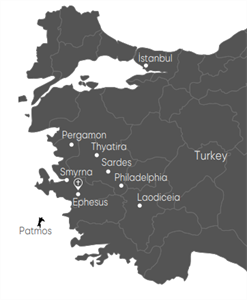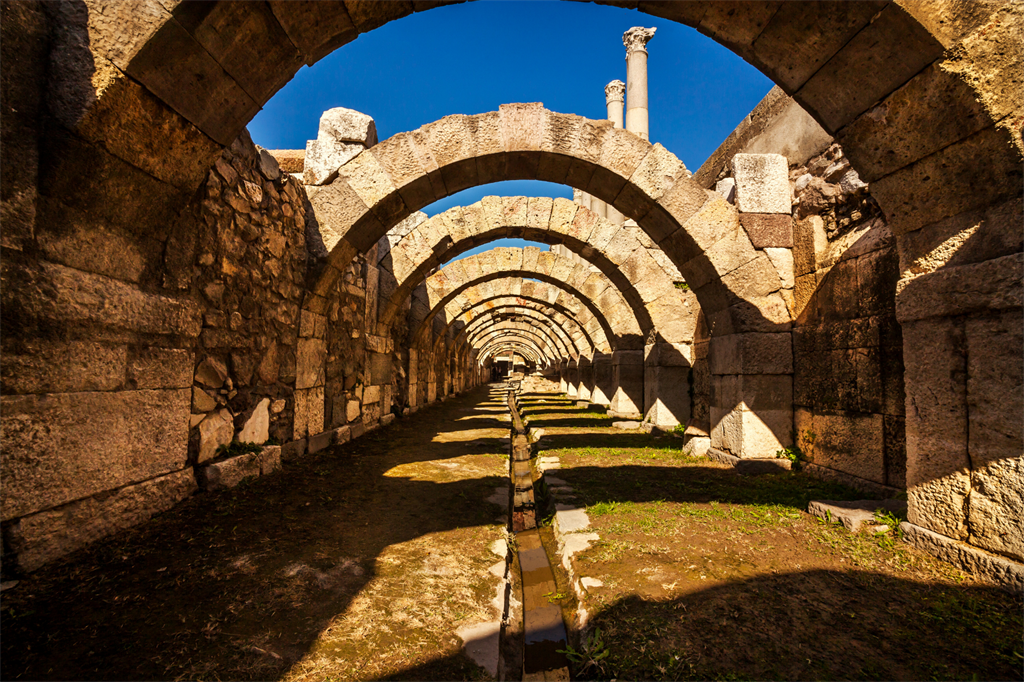Ephesus
Ephesus, modern-day Selçuk, has been a significant site since the Neolithic Period. It was home to settlers from Mainland Greece and witnessed the influence of the Hellenistic, Roman, Byzantine, and Ottoman Empires. Moreover, it played a significant role in the lives of early Christian believers. A letter to the city advised its residents to avoid evil and work diligently. After the crucifixion of Jesus, the Virgin Mary and other apostles, along with St. John, settled in Anatolia and established the first Christian community here, away from public view. The Church of the Virgin Mary in Ephesus is also considered an important pilgrimage center for Christians.
Pergamum
The Seven Churches of Revelation, mentioned in the Bible's Book of Revelation, include Pergamum (modern-day Bergama) as one of the seven prominent locations. Pergamum was part of the Roman Empire. According to the Christian narrative, an angry group in Pergamum martyred St. Antipas by burning him alive in 92 AD. In the letter to the church, while the community is praised for its perseverance, there is also a warning against compromising with the surrounding culture.
Smyrna
Smyrna, modern-day İzmir, remains one of the important port cities of the Aegean Region. In ancient times, it was a wealthy commercial hub and a source of inspiration for religious texts. One of the seven letters in the Book of Revelation was addressed to the city of Smyrna. One of the most renowned early Christian martyrs, Polycarp, the Bishop of Smyrna, was martyred around 155 AD. His martyrdom serves as a powerful example of the suffering endured by the Christian community in Smyrna.
Thyatira
The ancient city of Thyatira, one of the cities mentioned in the Book of Revelation, is today known as the modern city of Akhisar. The Bible refers to two women in Thyatira. One of them, a woman named Jezebel, is said to have led Christians astray and caused them to sin. The other woman mentioned in the Bible is Lydia. While Jezebel was condemned, Lydia was highly praised. Lydia was a hardworking woman, engaged in the textile trade in Thyatira. It could even be said that Lydia is one of the earliest known businesswomen in history. She is believed to have discovered the purple dye of the Judas tree by combining several different colors. She is considered one of the first people to convert to Christianity after being influenced by St. Paul's sermons in Macedonia.
Sardes
Sardis, modern-day Salihli, was the capital of the Lydian Kingdom and is historically significant as the place where money was first minted under the guarantee of the state. In addition to its economic importance, the city was a vital center for both Jews and Christians. However, despite its prosperity, Sardis was characterized by complacency—a trait that extended to its spiritual condition, as highlighted in the Book of Revelation. Sardis’ role in Revelation conveys an important spiritual lesson about the dangers of complacency and the need for vigilance in faith.
Philadelphia
Philadelphia, one of the Seven Churches mentioned in the Book of Revelation, is located in modern-day Alaşehir. Philadelphia was a missionary city, spreading Greek culture and later Christianity. Its strategic location made it a gateway for sharing the Christian faith with the surrounding regions. In the Book of Revelation, Philadelphia's church is praised for its unwavering faith and commitment, even in the face of trials.
Laodicea
Laodicea, now modern-day Denizli, near the ancient city of Hierapolis, was a Hellenistic city founded in the 3rd century BC. It became one of the most important centers of the region for centuries. The church in Laodicea is known for receiving a stern rebuke in its letter, warning against lukewarm faith and spiritual complacency. The aqueduct system that brought lukewarm water to the city is a physical reminder of the spiritual metaphor in Revelation. Since the 4th century AD, the ancient city has been recognized as one of the sacred centers of Christianity, and ongoing excavations continue to uncover many unique ruins.

.png)




Comments
No comment left, would you like to comment?